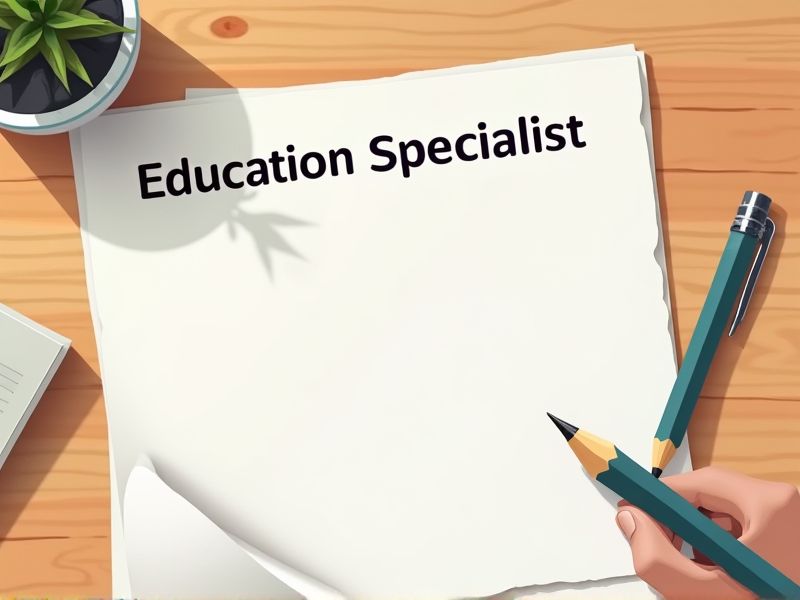
Education specialists are tasked with enhancing educational programs and curricula, which requires a blend of practical knowledge and theoretical insight. Certifications provide validation of skills and expertise, often leading to improved educational approaches and outcomes. They also signify a commitment to professional development, making specialists more attractive to employers. Here are several key certifications that may be essential for an Education Specialist.
National Board Certification for Educators
National Board Certification enhances the credibility and skill set of Education Specialists by providing a rigorous standard of teaching excellence. Achieving this certification leads to improved student outcomes, as educators are equipped with advanced instructional strategies. It also fosters professional growth and reflective practice, promoting continuous improvement in teaching methods. School systems often recognize certified educators with higher salaries and leadership opportunities, incentivizing continuous professional development.
Advanced Instructional Specialist Certification
The Advanced Instructional Specialist Certification enhances expertise, leading to improved teaching strategies and student outcomes. It serves as a validation of specialized skills, increasing employability and career advancement potential. Certified specialists are better equipped to implement evidence-based practices in diverse educational settings. This certification fosters a culture of continuous professional growth and adaptation to evolving educational demands.
Reading Specialist Certification
Reading Specialist Certification is vital for an Education Specialist because it enhances the ability to identify and address diverse reading challenges in students. Proficiency in advanced literacy techniques fosters improved instructional strategies tailored to individual learning needs. Access to specialized tools and assessments allows for more accurate diagnosis of reading difficulties. This certification elevates professional credibility and effectiveness in fostering student literacy development.
TESOL Certification
Holding a TESOL certification equips education specialists with methodologies specifically tailored for teaching English to non-native speakers. It enhances the ability to develop curricula that are both culturally relevant and linguistically accessible. Schools and educational institutions often require TESOL certification to ensure instructors can meet diverse student needs effectively. The certification improves job prospects by validating the specialist's competence in English language instruction.
Special Education Certification
Having special education certification ensures that an education specialist is equipped with the necessary skills to address diverse learning needs. This certification enables the specialist to develop effective strategies for individualized education programs (IEPs) tailored to students' unique challenges. Educators with this certification are better prepared to implement legally compliant teaching practices and accommodations. School districts increasingly require certified individuals to meet federal and state regulations, ensuring high standards of education for students with disabilities.
Curriculum and Instruction Certification
Curriculum and Instruction Certification equips education specialists with advanced skills for designing effective learning experiences, thus enhancing student outcomes. This certification provides educators with the tools to evaluate and improve teaching methodologies, aligning instruction with educational standards. Certified specialists are often seen as leaders in implementing innovative practices that promote academic success. In a continuously evolving educational landscape, possessing this certification fosters professional growth and credibility within the field.
Educational Leadership Certification
Educational Leadership Certification equips education specialists with necessary skills to effectively manage and lead educational programs. It enhances their ability to implement policies and improve school administration, ensuring better outcomes for students. The certification is often required to meet state or institutional standards, which validates a professional's capability in educational leadership roles. It also fosters leadership competencies that directly impact teacher performance and student achievements in a positive manner.
Instructional Coaching Certification
Instructional coaching certification equips education specialists with structured methodologies for enhancing teaching effectiveness, which directly impacts student outcomes. When education specialists possess certification, they gain credibility and trust among educators, fostering a more collaborative learning environment. Certified education specialists can more effectively analyze educational challenges and implement evidence-based interventions. The formal training associated with certification ensures specialists stay current with educational research and best practices.
Data-Driven Decision Making in Education Certification
Data-Driven Decision Making in Education Certification equips education specialists with the skills to interpret and utilize data effectively, enhancing student outcomes. Access to comprehensive data analysis tools enables specialists to identify trends and gaps in educational achievement, guiding targeted interventions. Certification ensures that specialists are capable of integrating evidence-based practices into educational strategies, fostering improved teaching methodologies. Establishing a culture of informed decision-making within educational institutions can lead to more efficient resource allocation and curriculum development.
Educational Technology Integration Certification
Education specialists benefit from an Educational Technology Integration Certification because it enhances their ability to effectively incorporate digital tools into teaching strategies, which has been shown to improve student engagement and learning outcomes. This certification ensures that educators are well-versed in current technological trends, helping schools stay innovative and competitive. By possessing this qualification, educators can better support their colleagues in tech-related professional development, fostering a more collaborative and tech-savvy teaching environment. Additionally, this certification can lead to career advancement opportunities by showcasing a specialist's commitment to ongoing education and technology proficiency.
Summary
You will likely gain a broader range of teaching methodologies when you obtain certifications as an Education Specialist. This can lead to more effective communication and engagement with students. Schools and educational institutions often recognize these additional qualifications, enhancing your career opportunities and job security. Certification can also boost your credibility and reputation among peers and supervisors.
